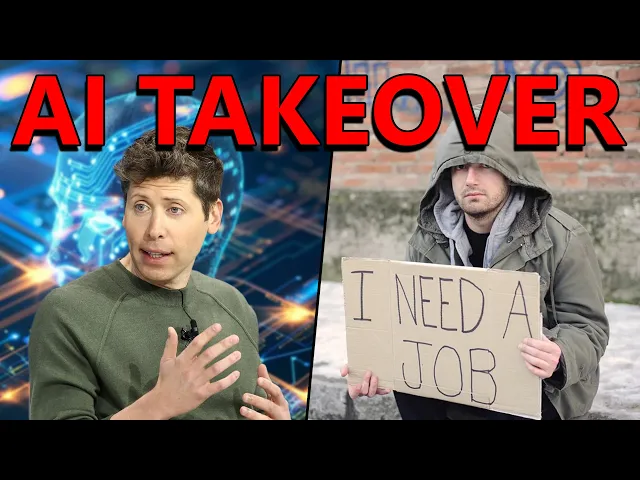AI Oligarch Warns Jobs to be WIPED OUT, AI Healthcare Takeover

AI oligarchs shaping our future
The recent Senate Judiciary Committee hearing on artificial intelligence offered a fascinating glimpse into how tech billionaires envision our AI-driven future. While witnesses like Bill Gates, Sam Altman, and Jensen Huang presented optimistic visions of AI's transformative potential, their testimony reveals deeper questions about who will control these technologies and how they'll reshape our economy and healthcare system. The contrasts between their perspectives highlight the complex power dynamics at play as AI development accelerates.
Key insights from the hearing
-
Healthcare transformation: Bill Gates emphasized AI's potential to revolutionize healthcare by addressing worker shortages through automation and improving diagnostic capabilities, though he acknowledged the challenge of ensuring accessibility in developing countries.
-
Economic disruption: While the tech leaders downplayed immediate job displacement concerns, Gates specifically mentioned that AI will eventually replace jobs that "aren't that fulfilling," suggesting significant labor market changes are inevitable.
-
Governance tensions: The panel revealed fundamental disagreements about AI regulation, with Gates favoring a light-touch approach while others acknowledged the need for some guardrails—leaving open questions about who should decide AI's development path.
-
Technical infrastructure: Jensen Huang's testimony highlighted how companies like NVIDIA are building the fundamental hardware infrastructure that makes AI development possible, creating dependencies that consolidate power within the tech ecosystem.
-
Geopolitical competition: The witnesses framed AI development as a national security priority where America must lead, potentially justifying rapid deployment with minimal oversight.
The power paradox at the heart of AI development
The most striking element of this hearing wasn't what was said, but what remained implicit: the extraordinary concentration of decision-making power in the hands of a small group of tech leaders. When Gates speaks about healthcare transformation, he's not merely offering analysis—he's describing a future his own investments and influence help create. The casual way these leaders discuss reshaping entire industries reflects their unprecedented ability to implement their visions with minimal democratic input.
This matters tremendously because AI deployment at scale will fundamentally reorganize economic power. Consider healthcare: if AI systems do replace significant portions of medical labor as Gates suggests, who will own these systems? Who will control the data they're trained on? And how will the economic benefits be distributed? The hearing offered little clarity on these crucial questions.
Beyond the billionaire
Recent Videos
How To Earn MONEY With Images (No Bullsh*t)
Smart earnings from your image collection In today's digital economy, passive income streams have become increasingly accessible to creators with various skill sets. A recent YouTube video cuts through the hype to explore legitimate ways photographers, designers, and even casual smartphone users can monetize their image collections. The strategies outlined don't rely on unrealistic promises or complicated schemes—instead, they focus on established marketplaces with proven revenue potential for image creators. Key Points Stock photography platforms like Shutterstock, Adobe Stock, and Getty Images remain viable income sources when you understand their specific requirements and optimize your submissions accordingly. Specialized marketplaces focusing...
Oct 3, 2025New SHAPE SHIFTING AI Robot Is Freaking People Out
Liquid robots will change everything In the quiet labs of Carnegie Mellon University, scientists have created something that feels plucked from science fiction—a magnetic slime robot that can transform between liquid and solid states, slipping through tight spaces before reassembling on the other side. This technology, showcased in a recent YouTube video, represents a significant leap beyond traditional robotics into a realm where machines mimic not just animal movements, but their fundamental physical properties. While the internet might be buzzing with dystopian concerns about "shape-shifting terminators," the reality offers far more promising applications that could revolutionize medicine, rescue operations, and...
Oct 3, 2025How To Do Homeless AI Tiktok Trend (Tiktok Homeless AI Tutorial)
AI homeless trend raises ethical concerns In an era where social media trends evolve faster than we can comprehend them, TikTok's "homeless AI" trend has sparked both creative engagement and serious ethical questions. The trend, which involves using AI to transform ordinary photos into images depicting homelessness, has rapidly gained traction across the platform, with creators eagerly jumping on board to showcase their digital transformations. While the technical process is relatively straightforward, the implications of digitally "becoming homeless" for entertainment deserve careful consideration. The video tutorial provides a step-by-step guide on creating these AI-generated images, explaining how users can transform...
